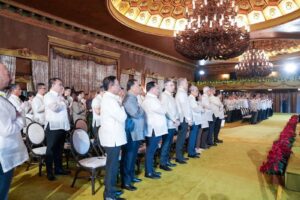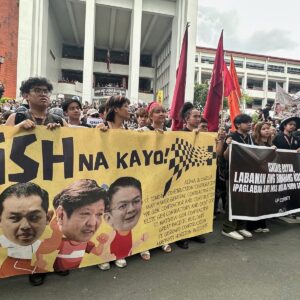The End of Secrecy: Government Transparency Takes Center Stage

A monumental shift in the Philippines’ fight against graft and corruption is underway, marked by the recent decision to open government officials’ Statements of Assets, Liabilities, and Net Worth (SALN) to public scrutiny. This move signals a strong commitment from the administration of President Ferdinand Marcos Jr. to usher in a new era of transparency and accountability, threatening the long-established power structures that shielded corrupt practices.
The initiative, championed by Justice Secretary Jesus Crispin “Boying” Remulla, aims to restore public trust by making the financial records of public servants accessible to the citizens they serve—a complete reversal of previous restrictive policies.
“The public has a legitimate, inherent right to know precisely how those in government acquire and manage their wealth,” stated Secretary Remulla. “Transparency is not merely a political slogan; it is the most effective safeguard against systemic corruption.”
Overturning the Martires Memo: The Ombudsman’s Pivotal Shift
The crucial change stems from the Office of the Ombudsman’s decision to grant broader public access to these sensitive financial documents. This move effectively revokes a controversial memorandum previously issued by former Ombudsman Samuel Martires during the Duterte administration, which had severely restricted the release of SALNs.
Under the old rules, releasing an official’s SALN was virtually impossible, requiring the written consent of the official themselves—a prerequisite rarely, if ever, granted. This opacity fueled public suspicion, giving rise to the pervasive question: “Why the need to hide something if there is nothing to hide?”
The new circular dramatically simplifies the process. Requests for SALN copies will now be automatically granted to any individual or entity, provided the information is not used for illicit purposes such as harassment, extortion, or other purely personal gain.
The Anatomy of a Lifestyle Check: What the Public Will See
While safeguarding personal security, the new policy ensures that the core elements necessary for public oversight remain accessible. Sensitive personal data, such as home addresses, names of minor children, personal signatures, and government IDs, will be redacted.
However, the public will gain critical access to:
Real Properties and Assets: Details on land, buildings, and other valuable real estate holdings.
Assessed Values: The official valuation of these properties.
Bank Accounts: Information regarding accounts, though specific balances may remain shielded depending on the final interpretation of privacy laws.
Business Interests and Financial Connections: Details on companies and investments held by the official.
This level of disclosure will enable citizens and investigative bodies to conduct far more effective lifestyle checks. For instance, an official with a documented net worth of ₱5 million but who openly possesses multiple luxury vehicles and vast estate properties will immediately trigger scrutiny regarding the source of their wealth, making it easier to pinpoint unexplained discrepancies.
Beyond the SALN: The Integration of Blockchain Technology
The push for financial transparency is being complemented by the Marcos administration’s reported plan to integrate a blockchain system for monitoring government funds.
This groundbreaking technological step would log every movement of public money—from national budget allocations and official salaries to project disbursements—onto a secure, decentralized blockchain ledger. The inherent immutable nature of blockchain technology means that transactions cannot be retroactively edited, manipulated, or fabricated, creating an ironclad digital trail.
The combination of readily available SALNs and an unalterable blockchain record presents a dual-pronged assault on corruption, severely limiting the opportunities for illicit enrichment within the bureaucracy.

Facilitating Investigation and Universal Accountability
Secretary Remulla emphasized that evidence of a public official’s lifestyle being clearly inconsistent with their declared SALN could now be directly utilized in formal investigations under Republic Act 3019 (the Anti-Graft and Corrupt Practices Act). The transition from mere speculation to documented, evidence-based inquiry will make prosecuting graft cases significantly more manageable.
Currently, the Ombudsman holds the SALNs for the President and Vice President, heads of constitutional offices, and local officials at the LGU level. However, the Ombudsman has issued a strong directive, urging other key agencies—including the Civil Service Commission, the Office of the President, the Judiciary, and various Local Government Units—to similarly open the SALNs under their custody.
“Selective transparency only breeds suspicion,” Remulla asserted, underscoring the need for the uniform application of disclosure across all branches of government.
Public Reception and the Path to a Cleaner Governance
The new policy has been widely lauded by civil society groups, media organizations, and political analysts. Many view the move as the first concrete and decisive step by the new administration to seriously tackle the endemic issue of corruption that has plagued the system for decades. As one commentator noted, “This is the first time we have a government willing to operate in the full light of day.”
While some detractors—particularly those affiliated with the former administration—have decried the policy as a “political witch hunt,” the prevailing sentiment remains that truth should not be feared by those with nothing to hide.
This landmark action is a clear sign that the Marcos Jr. administration intends to reform a system long compromised by corruption. If sustained, this potent combination of transparency, advanced technology, and vigorous investigation promises to significantly reclaim public trust.
Ultimately, the message is unequivocal: “The people have the right to know who genuinely serves them, and who merely deceives them.” For those officials engaged in illicit activities, the space to hide has shrunk drastically, as the light of truth is finally breaking through the darkness.





